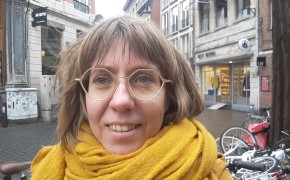The CiLAB Collective creates and spreads knowledge about circular textiles. Buying less and local, while making better textiles and ensuring reuse of materials.
In May 2020, three circular entrepreneurs set up the CiLAB collective that experiments with circular techniques in order to allow fashion to access circularity and involve citizens in circular economy. The founders have similar backgrounds and felt the urge to draw and test viable and transparent circular loops for all kinds of textiles.
The city of Mechelen shares the CiLAB goals: circular textile chains, local and circular production and a focus on vulnerable citizens without access to the job market. The city of Mechelen has supported CiLAB with advice, matchmaking towards potential partners, communication support in a local magazine and on social media.
CiLAB grasped the opportunity to set up a small textile lab in the city of Mechelen, with seven second-hand industrial sewing machines, two cutting tables, and a monthly rent that went beyond all rational business planning. The focus was on making the move from linear to circular. That is the priority and how they define their mission: creating awareness through the coaching of students, finding innovative ways to collaborate with social sorting centres, refugees, fashion brands and local authorities. In this fresh and circular ecosystem, upcycling processes will be tested, prototypes created, and small-scale productions approvable for scale-up will be set up.
Resources needed
The city of Mechelen supported the collective with the amount of 5.000 euro seed money through Climate Action in 2021.
Main financial resources to facilitate transition into circular business models:
Equipment for a studio: 10.000 euro
Rent & utilities: 4.000 euro/year
1 FTE craftsman: 50.000
Evidence of success
Within 12 months of the practice, collaborations with two important clothing brands as well as with small-scale start-up companies have been set up, as well as several collaborations with fashion schools and the local community.
Difficulties encountered
Integration of highly skilled professionals with a refugee background in a start-up initiative did not match the Belgian social framework. A lot of research and consultations later, CiLAB could offer their refugee tailor a standard labor contract without government subventions.
Potential for learning or transfer
Key success factors for a transfer are full transparency on effort and cost that is provided to the brands and partners involved, which increases their learning curve and provides a low-risk laboratory environment.
The CiLAB Collective promotes collaboration with the local community through spin-off projects with broad local engagement. The practice increases the level of flexible production of small-scale collections as well as rapid prototyping through the local availability of skilled individuals.
Please login to see the expert opinion of this good practice.
Tags: Circular economy, Refugee, Reuse, Reuse of waste, Social inclusion, Textile, Transition








